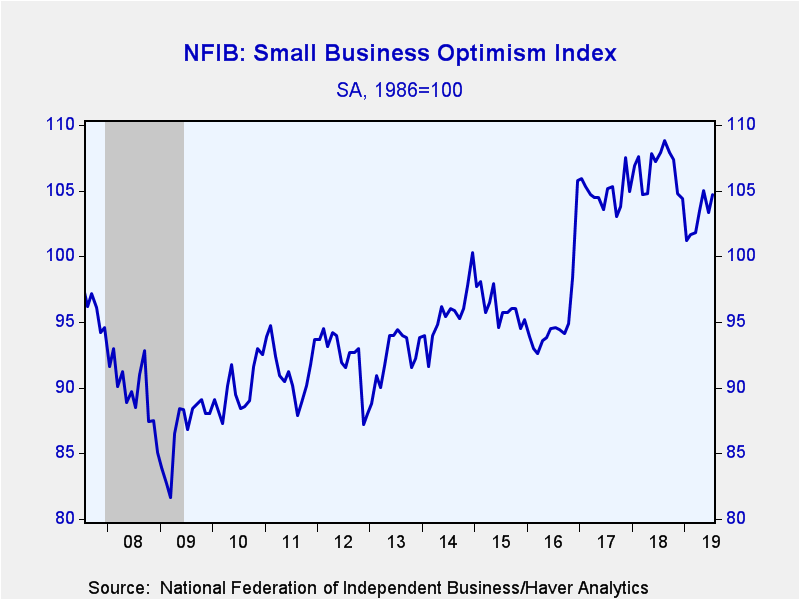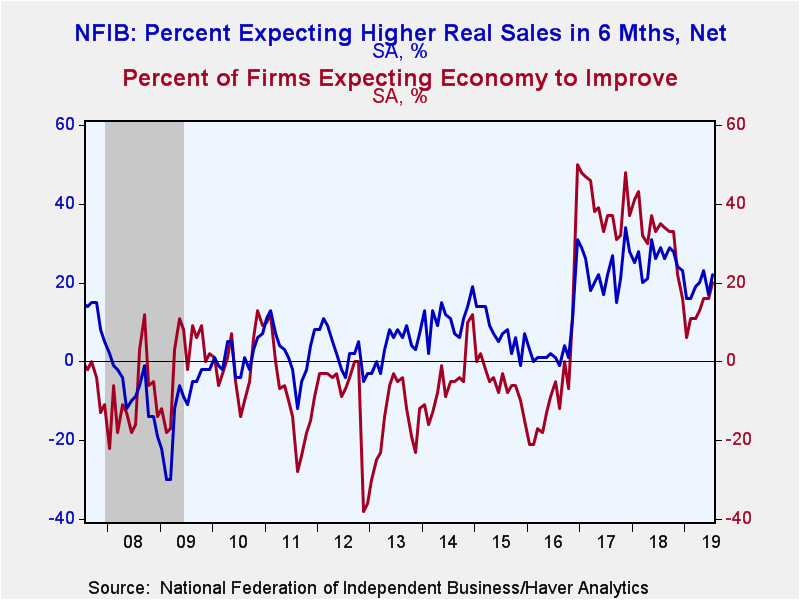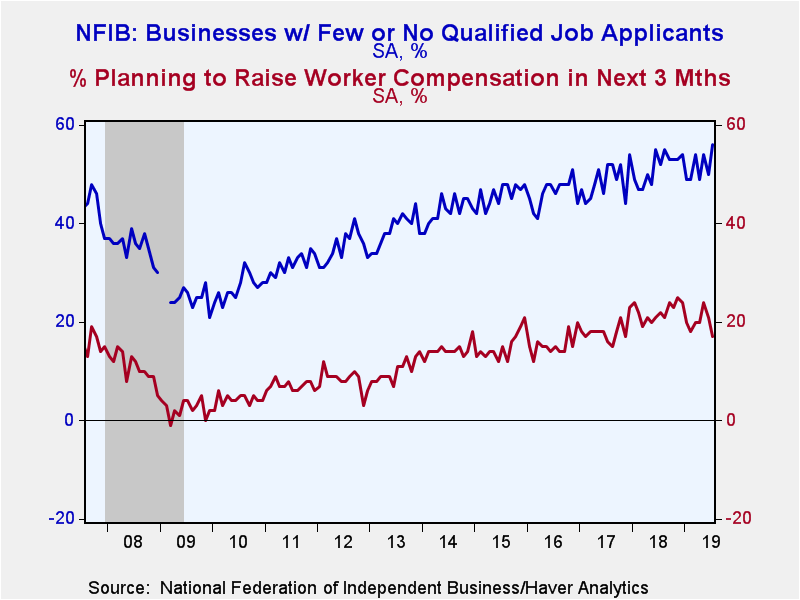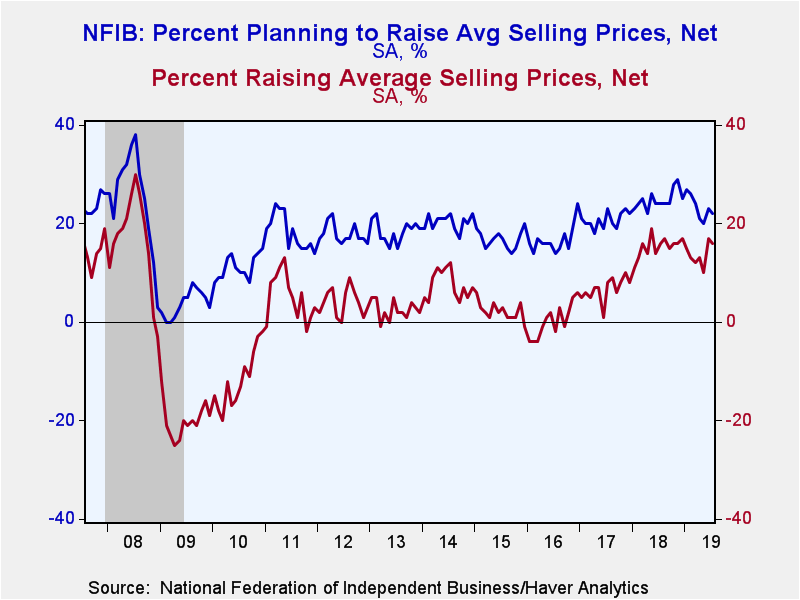 Global| Aug 13 2019
Global| Aug 13 2019U.S. Small Business Optimism Improves
by:Tom Moeller
|in:Economy in Brief
Summary
The National Federation of Independent Business (NFIB) reported that its Small Business Optimism Index rose to 104.7 during July and recaptured most of its decline during June. The index improved 1.4% m/m, but was down 3.0% y/y. An [...]
The National Federation of Independent Business (NFIB) reported that its Small Business Optimism Index rose to 104.7 during July and recaptured most of its decline during June. The index improved 1.4% m/m, but was down 3.0% y/y.
An improved 22% of firms expected higher real sales and an increased 20% of respondents expected the economy to improve. That remained down, however, from a high of 48% in January 2017. A slightly higher 26% thought that now was a good time to expand the business. Twenty-seven percent of firms expected to make capital outlays, down from the high of 33% last August.
A net 16% of firms were raising average selling prices, up from 10% in May. Expected pricing power slipped last month as a lessened 22% of firms were planning to raise prices, down from 29% in November.
Labor market readings improved during July. The 21% of respondents planning to increase employment was increased m/m, but remained below the record 26% reached last August. The ability to find qualified workers, however, has become difficult. A record 56% of firms were finding few or no qualified candidates for job openings.
As a result of this difficulty, an improved 32% of firms were raising worker compensation. Plans for the future weakened, however, as a lessened 17% of firms planed to raise worker pay, the least since November 2017.
Credit remained easy to get last month. Only three percent of firms reported trouble obtaining financing versus two percent in June.
The small business survey inquires about additional issues facing small business. A record 26% reported problems with the quality of labor. A higher 18% indicated that taxes were the largest problem. Government requirements were worrisome to a steady 13% of respondents, but that was below the September 2013 high of 24%. A lessened nine percent of firms reported the cost of labor as the most significant problem, but that nearly equaled February's record. Competition from large businesses held at nine percent as the biggest problem. Insurance costs/availability concerned a lessened nine percent of respondents. Poor sales were the biggest problem for a steady seven percent of businesses. Financial & interest rate problems worried two percent of respondents. Inflation concerned only two percent of respondents as the biggest problem, about where its been since 2015.
Roughly 24 million small businesses exist in the U.S. and they create 80% of all new jobs. The index is based 1986=100. The typical NFIB member employs 10 people and reports gross sales of about $500,000 a year.
The NFIB figures can be found in Haver's SURVEYS database.
| National Federation of Independent Business (SA, Net % of Firms) | Jul | Jun | May | Jul'18 | 2018 | 2017 | 2016 |
|---|---|---|---|---|---|---|---|
| Small Business Optimism Index (1986=100) | 104.7 | 103.3 | 105.0 | 107.9 | 106.7 | 104.9 | 95.3 |
| Firms Expecting Economy to Improve | 20 | 16 | 16 | 35 | 32 | 39 | -5 |
| Firms Expecting Higher Real Sales | 22 | 17 | 23 | 29 | 26 | 23 | 5 |
| Firms Reporting Now Is a Good Time to Expand the Business | 26 | 24 | 30 | 32 | 30 | 23 | 10 |
| Firms Planning to Increase Employment | 21 | 19 | 21 | 23 | 21 | 18 | 11 |
| Firms With Few or No Qualified Applicants for Job Openings (%) | 56 | 50 | 54 | 52 | 51 | 49 | 46 |
| Firms Expecting to Make Capital Outlays | 27 | 26 | 30 | 30 | 29 | 28 | 26 |
| Firms Reporting That Credit Was Harder to Get | 3 | 2 | 4 | 4 | 4 | 4 | 5 |
| Firms Raising Average Selling Prices | 16 | 17 | 10 | 16 | 15 | 7 | 0 |
| Firms Raising Worker Compensation | 32 | 28 | 34 | 32 | 33 | 27 | 24 |
Tom Moeller
AuthorMore in Author Profile »Prior to joining Haver Analytics in 2000, Mr. Moeller worked as the Economist at Chancellor Capital Management from 1985 to 1999. There, he developed comprehensive economic forecasts and interpreted economic data for equity and fixed income portfolio managers. Also at Chancellor, Mr. Moeller worked as an equity analyst and was responsible for researching and rating companies in the economically sensitive automobile and housing industries for investment in Chancellor’s equity portfolio. Prior to joining Chancellor, Mr. Moeller was an Economist at Citibank from 1979 to 1984. He also analyzed pricing behavior in the metals industry for the Council on Wage and Price Stability in Washington, D.C. In 1999, Mr. Moeller received the award for most accurate forecast from the Forecasters' Club of New York. From 1990 to 1992 he was President of the New York Association for Business Economists. Mr. Moeller earned an M.B.A. in Finance from Fordham University, where he graduated in 1987. He holds a Bachelor of Arts in Economics from George Washington University.










